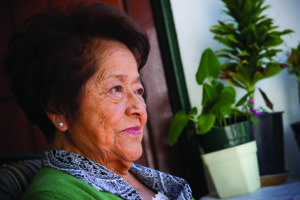Caregivers are some of the most selfless people you will find, constantly putting the needs of others before their own. In Hawai‘i, over 65,000 people are family caregivers for almost 30,000 loved ones living with Alzheimer’s or another dementia. In my seven years of experience working with family caregivers, I’ve seen caregivers who make many sacrifices, sometimes neglecting their own health and often postponing vacations for years. If this is you, it’s time to focus on self-renewal.
Go back in time
What types of things did you like to do when ou had more free time? What did you enjoy in your youth? Make a list of three things that you absolutely love and turn these things into activities. For example, acknowledge your love for dogs, then plan an activity that engages a favorite furry friend. If you love music, make plans to see your favorite performer in concert.
It is important not to get stuck in feelings of guilt for taking this needed time away from caregiving. Schedule activities from your “absolutely love” list into your calendar ambitiously this year.
Isolation and caregiving go hand in hand. When people are getting close to burnout level, they may distance themselves from friends, family and social activities. But the best thing you can do for the person you are caring for is stay physically and emotionally strong.
Burnout stems from the decrease in self-care. It entails more than maintaining physical health; emotional support is an important part of self-care. Have you ever considered meeting fellow caregivers and talking story? Support groups offer comfort and reassurance, and can be a great source of practical advice. The Alzheimer’s Association Hawai‘i Chapter offers free support groups for family caregivers every month. The groups are filled with wisdom, tears and even humor. To find a caregiver support group in your neighborhood call the Alzheimer’s Association 24/7 Helpline at 800-272-3900.
Examine your coping strategies
Make a list of the positive things you do to relieve stress. Turn those into activities and add them to your coping list. Do what is realistic for everyday life.
Restore your energy
This year, focus on ways to recharge yourself, even if that means simply starting with two minutes a day just for you to breathe. Give yourself more energy by giving yourself more time.
What do you need to feel healthier or stronger? Eat well and exercise regularly to increase energy levels. Slow it down. Multitasking is part of the caregiving cycle, but try to limit multitasking in order to be more mindful. Consider building a relaxing sleep routine and finding ways to clear your mind before bedtime.
Talk to someone
If you are waking up tired each morning, it may be time to talk to someone. Caregiver depression has been called a silent health crisis. Between 40 and 60 percent of caregivers experience depression. This can happen to anyone who puts their own physical and emotional needs on the back burner for an extended amount of time.
Depression affects individuals in different ways and at different times. For example, some may experience depression right after a loved one has been diagnosed with Alzheimer’s, while others may experience it as the disease progresses. There is no shame in depression. For more information, visit www.alz.org/help-support.
For the caregivers reading this, know that you are invaluable, so promise to focus on your own vitality. Seek what will support your spirit and strengthen hope. Make 2023 your year.
Support for Alzheimer’s disease or a related dementia:
24/7 Helpline 800-272-3900 | 808-591-2771
www.alz.org/Hawaii
www.alz.org/help-support/i-have-alz/younger-onset
Walk to End Alzheimer’s donations: act.alz.org/aloha



Leave a Reply